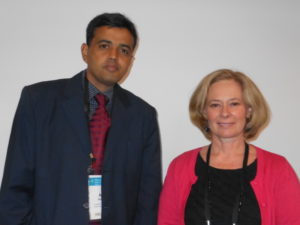
2014 Young Scholar: Abu Abdullah

Abu Abdullah
Charles Darwin University
Sponsored by the NT Committee
Abu has just completed a PhD in natural resource management at Charles Darwin University. His PhD thesis is an innovative livelihoods study in the fields of natural resource management, poverty eradication and climate change adaptation. Abu has been a Bangladesh government official since 2001. He worked in the riverine areas of northern Bangladesh where millions of people face periodic food shortages every year. The population of Bangladesh was 154 million in 2012. The country has made steady growth in food production however chronic food insecurity remains a challenge.
Conference report
I gained an insightful and balanced understanding of the complexities surrounding farming and food security issues in different parts of the world.”
In August this year I had the privilege of attending the 2014 Crawford Fund Parliamentary Conference on “Ethics, Efficiency, and Food Security: Feeding The 9 Billion, Well” held between 26 and 28 August 2014 in the Parliament House, Canberra. The Conference spanned three days and included presentations by distinguished researchers and policy makers from across the globe. It was followed by panel discussions and opportunities to network with future colleagues. The discussions throughout the conference with other delegates including young scholars were inspiring.
Prominent experts at the conference spoke at length the food security issue that the globe’s burgeoning population is already facing. Food security is a major day-to-day challenge for the world’s seven billion people and the feeding of another two billions within the next few decades would be a gigantic task – one that could radically change global politics, impose tremendous burden on the world’s depleted biodiversity and its shaky climate and bring new existential challenges to the an array of countries, which periodically face chronic food shortages, including my native land, Bangladesh. The discussions were fascinating given that it came from some of the renowned scholars of all branches of farming and food industry.
The conference was also well-attended. It was my pleasure to meet not only researchers working on agriculture but also government bureaucrats who shape food policies, industry experts and young researchers. After attending all the discussions during the three days of deliberations, I gained an insightful and balanced understanding of the complexities surrounding farming and food security issues in different parts of the world. One major benefit for me from attending the conference was to meet the researchers from IFPRI, ICRiSAT who have been working in international agricultural research projects including in Bangladesh.
Access to food is fundamental human rights yet each day 800 million people live with food shortages. To ensure food security participation of women and their rights in agriculture should be facilitated by the policy makers with focus on providing more incentives as suggested by the key note speaker at the conference. More than two billion people are micronutrient deficient and some presenters emphasised the need to develop a shift in paradigm: from food security to nutrient security. Agriculture has historically been in competition over land use, human settlement as well as water use and pollution. Food-security achievement must have policy interventions these challenges and also address some of the like issues such as urban planning, population control and sustainability in the face of climate change instability. “Climate-smart agriculture” has therefore become the need of the hour with the focus on preserving vital natural resources, reducing carbon emissions and feeding people holistically in a sustainable way. While attempts had been made to increase productivity, less attention had been given to wastage of food at different stages of value chain due to consumer choice. Ethical concern was raised in relation to GMO foods and increasing uses of crops products being diverted to produce biofuel.
Eventually the answer to the question: “Can we feed 9 billion people?” must be found by the researchers and policy makers. There are nations which are eager to support with their huge farm land and research establishment. One of such nations is Australia. It was highlighted that the Australian government’s key priority is to invest in agriculture. Foreign Minister Bishop explained that the nation’s state-run aid agency has become more result and outcome-driven and put priorities in agriculture, fisheries and sustainable use of water. The world’s all nations must work together towards the elimination of hunger and malnutrition in addition to improving economies through agricultural development. The need for agricultural research to meet these goals opens opportunities for collaboration with Australia as the Australian agriculture does have a role to play in helping meet growing food demand in Asia and Africa.
For me the 2014 Crawford Fund Annual Conference was an excellent occasion to meet, learn and network with many people involved in the fields of farming, livestock, rural development, research and policy making from both Australia and the rest of the world. Attending the conference was one of the best opportunities that came my way and which would motivate me to pursue future career in agriculture development.
